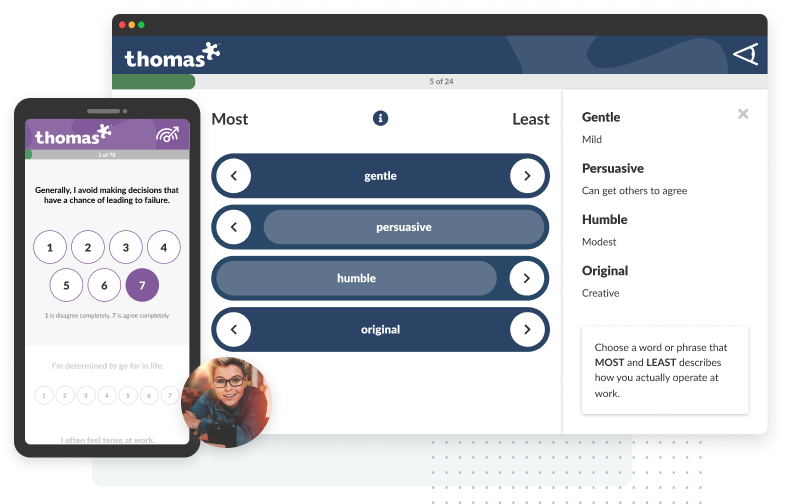Curious about candidate assessment tools and how to use them? We recently spoke with Terry Weir, a senior consultant with global psychometric assessment provider Thomas International about the top assessment tools in the hiring process. Read our Q&A with Terry as he shares insights on the various types of assessments, the role of assessments in recruiting, AI and more.
1. In a nutshell, tell us about the various assessments Thomas International offers recruiters and companies.
One of them is our Personal Profile Analysis (PPA) that looks at workplace behavioural preferences and candidate communication preferences. You hear how nicely, or perhaps not so nicely, a candidate aligns with the behavioural demands of the job.
We also have our General Intelligence Assessment (GIA). It looks at speed and accuracy. If you’re hiring a candidate who doesn’t come from the industry, you can see how quickly they would learn and grasp a new role.
We also have our Trait Emotional Intelligence Questionnaire (TEIQue). It looks at 15 different facets of emotional intelligence, everything from empathy to self motivation to optimism to emotion management, and much more.
We also have a leadership assessment called our High Potential Trait Indicator (HPTI). It looks at one’s personality and how it is aligned for predicting leadership potential. On top of that, we also have a 360 tool, which gets feedback from peers in the workplace to see what a person needs to work on within their organization.
2. What types of data and insights do these assessments offer clients who are hiring?
Every job has behavioural demands that get placed on people, and so we look at the behavioural preferences of people. Instead of comparing Candidate A to Candidate B, assessments help you better compare candidate A to the job, compare Candidate B to the job and so on. The behavioural assessment, or PPA, is our most widely used assessment because it’s applicable in literally just about any setting, whether it’s entry level, mid level or senior level. This is something that is going to impact performance.
There are also many hiring managers who sometimes fall into traps of their own making. For instance, if they had one particular individual who in the past did unbelievably well in a particular role, and they just assume, “I need somebody who is exactly like this person, because they did phenomenal.” Well, sample sizes of one are not particularly useful. Because you need to get a lot more data points than just one. There’s so many things that go into a person. What was it about that specific person that actually drove their success? Which of the variables mattered and which ones didn’t? Really good assessments can go a long way to shine a light on the things that actually matter and that drive performance.
3. How can recruitment assessment tools help with hiring decisions?
These help make more informed and objective decisions. Most hiring managers have strong opinions on what they think a particular role requires. But if a talent acquisition professional or a recruiter has the temerity to ask a hiring manager about why they are looking for specific things in a candidate, far more often than not, their answers are based on assumptions rather than data. And simply put, a lot of times their assumptions just aren’t that accurate.
Number one: Not only can assessments help you understand more about what a candidate brings to the table, but it will also help hiring managers make more intelligent decisions on what they should be looking for in the first place. Not just going with, “I want someone with X years of experience in my industry.” OK, but why X years? If you ask that question, most hiring managers don’t have a really well thought out, data-driven answer. It’s just that they think it matters (or that it should matter).
Good intentions are not good enough, even though you might wish they were. You need to actually know why certain things are predictive of performance, of work and of other things.
4. What sorts of problems can assessments help with in the workplace?
Good assessments do more than just act as good recruitment. They should help companies make well-informed and well thought out decisions that are predictive of performance on an ongoing basis, long after the hiring decision has been made.
You can’t just assume that, “I’ve made a great recruitment decision to hire a well-suited individual, so I don’t need to worry about anything.” Well, yes you do.
Good assessments help managers understand people – what makes them tick and what ticks them off – far faster than going through the awkward, fumbling get-to-know-you process that can take weeks or even months. A good assessment can provide reporting that helps a hiring manager understand, “Is this person detail-oriented or do they hate getting stuck in the weeds?” Or, “Does this person love working collaboratively with other people or are they more individualistic? Is this person concerned with power dynamics in working relationships?” And many other things as well.
5. Should a hiring decision be made based on the outcome of an assessment?
No. Good assessments add to an already existing, robust recruitment process, but it should not replace one. When I’m having debrief calls with clients and they’re saying, “Tell me more about this individual than what’s on this report,” I never say, “Yes, you should hire this person, or no you shouldn’t.” I provide more along the lines of, “If you choose to hire this person, these are some of the things you should expect. These are some of the things that you should really lean into, and these are some of the things you should really watch out for.”
6. Where do you see the future of candidate assessments heading? How will AI play a role in that?
I think assessments are going to become far more widespread in usage than they are currently. One reason is AI, because candidates are using AI to prep for interviews. Interviews have always been, for lack of a better word, an audition, where someone is putting their best foot forward. Hiring managers might be wondering, “Well, is what I’ve seen the real person or is this an act, or is this some sort of performance for my benefit?” AI is making it easier for candidates to do that, so it’s all the more reason to introduce something that is objective, that actually gets to the core and the actual matter of what this person is about.
7. Do you have any personal experiences to share where you recognized the power of an assessment?
I have had a couple of instances where I’ve gone over assessment results with individuals who have said it’s changed their lives. In one particular instance, someone decided to make a pretty dramatic career change based on the information they received in an assessment. They were doing well in terms of their employer being happy with their performance, but they weren’t particularly fulfilled with the work they were doing. After going through two different assessments, this particular individual came back to me after doing some soul searching. And now they were in a completely different field. Not only were they doing well, but they loved what they were doing.
I’ve also had many conversations that have ended with, “This explains a lot about why certain moments went the way they did… I get it now. I’m in a better position to handle situations differently and more aware of how other people are likely to see me, which is not necessarily in the same light as I see myself.”
To find out later, that the assessments and conversations I had with them made a massive, positive difference in their life, and now they’re dramatically happier, that’s pretty fulfilling.





